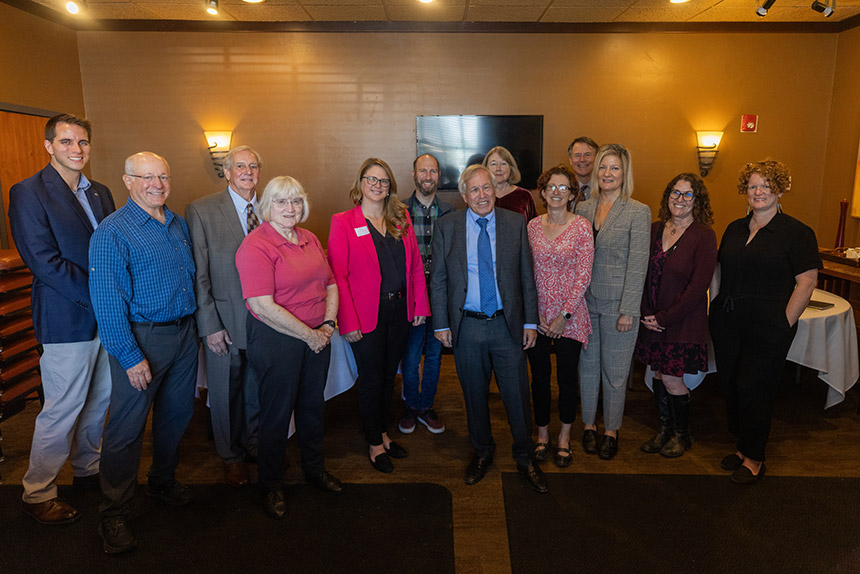
By Andrew Cohen
Not too long ago, the scene — Berkeley Law leaders going to Alaska and meeting with a diverse group of alums — would have seemed far-fetched. Yet over the past few weeks, Field Placement Director Sue Schechter visited to expand potential opportunities for students and Dean Erwin Chemerinsky joined Assistant Dean for Development and Alumni Relations Veronica Alexander to discuss avenues for mutual engagement.
“Our graduates there tell a common story that’s quite beautiful,” Alexander says. “Many describe how they were able to not only launch their legal careers in Alaska, but also rise faster in a shorter amount of time than they could elsewhere. They quickly realized they can live well, have upward mobility, and enjoy all the outdoors has to offer there.”
Alumni holding prominent legal roles in Alaska is nothing new.
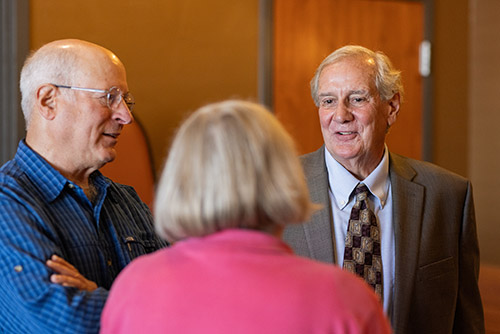
Jahna (McGranahan) Lindemuth ’97 served as Alaska’s Attorney General — just the second woman to hold that position — and oversaw the state’s 550-employee Department of Law. She is now a partner at Cashion Gilmore & Lindemuth in Anchorage.
Daniel Winfree ’81 spent 15 years as a justice on the Alaska Supreme Court and was chief justice from 2021 to 2023 before retiring last year. For a few years, he and fellow alum Walter “Bud” Carpeneti ’70 were two of the state’s five supreme court justices.
“I came to Berkeley every year for its on-campus interview program and have great memories of those trips,” Winfree says. “The interviews were open to almost anybody — sometimes I’d talk with 14 people in a day. We figured out who made sense to work for our court, the Court of Appeals, the trial courts … we had a really good run of great clerks from Berkeley.”
Noting the state’s collegial rather than cutthroat legal culture, Winfree appreciates seeing young attorneys soar in his home state.
“As a judge, it’s really rewarding seeing people you helped hire as clerks come argue before the court,” he says. “There’s a lot of emphasis on helping people become better lawyers, and with a small legal community like this you’re not going to be sitting in a firm doing discovery work for five years before you see a deposition or a courtroom. I argued cases before the state Supreme Court as a second-year associate.”
Court connections
Over the past several years, Berkeley Law students have attained great success landing judicial clerkships in Alaska. Geoff Bacon ’23 recently finished clerking for Alaska Supreme Court Justice Jennifer Henderson, and three classmates also clerked on the court during that time. In all, 27 alums have clerked for Alaska courts over the past five terms.
Last year, Drake Goodson ’24 of Alaska was named one of eight national law students of the year by National Jurist. He helped lead the Pro Bono Program’s Berkeley Law Alternative Service Trip to Alaska over spring break, and just began a federal clerkship in the Southern District of Texas.
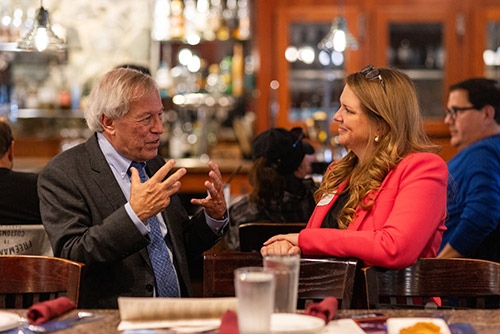
Jason Gist ’04 is a judge on the Alaska Superior Court, and Dallas Bullard ’15 is the career clerk for U.S. Ninth Circuit Court of Appeals Judge Morgan Christen — who’s based in Anchorage and spent two days on campus last fall for Berkeley Law’s annual Judges-in-Residence program.
“It’s extremely gratifying to see more Berkeley Law grads coming to Alaska,” says Tom Amodio ’85, a lawyer in the state for nearly four decades who focuses on commercial and real estate transactions. “It’s a great place to practice law, as both a young lawyer and an old Sourdough like me.”
Amodio grew up in New York, but went to Alaska for a semester during his second year of law school to clerk for a state Supreme Court justice. He started dating his now-wife, who was born in Anchorage, about two weeks before leaving his internship.
Reflecting the closeness of Alaska’s legal community, Lily Ginsburg ’23 walked into the dinner Schechter organized with various alums and was asked about her state Supreme Court clerkship and what she’d be doing next. Schechter says when Ginsburg conveyed that she’d be working at Reeves and Amodio — his firm — “Tom said, ‘Well how about that. I’m Tom Amodio.’”
Another telling example of Alaska’s small-world culture: Winfree hired Bacon to clerk at the state Supreme Court — and went to high school with his mother.
Boomerang effect
For Bacon, going to Berkeley Law wasn’t about leaving Alaska. It was about finding a school that could help him return to make a meaningful difference.
“As the first in my family to attend law school, I learned about Berkeley Law and its commitment to Native law students and the Native community through the Pathway to Law program it hosted in 2019,” Bacon says. “What impressed me was the excitement of current Native law students who shared their passion of being part of a growing Native cohort that was supported by the school. It was grounding to be part of this growing community during my time as a student.”
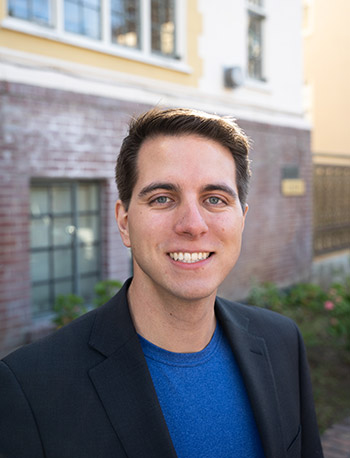
Clerking for the Alaska Supreme Court gave him a new perspective on how courts evaluate a party’s argument — and a motivation to encourage more Native law students to seek judicial clerkships. Bacon recently joined the Anchorage office of Sonosky, Chambers, Sachse, Miller & Monkman, which represents Alaska Native and American Indian tribes across the country in litigation, lobbying, economic development, and myriad other matters.
His firm recently — and successfully — represented the San Carlos Apache Tribe in historic litigation before the U.S. Supreme Court. The Court ruled that the Indian Health Service must pay contract support costs not only to support agency-funded activities, but also to support tribes’ expenditures of income collected from third-party payers such as Medicare and Medicaid. That decision is estimated to bring an additional $800 million to $2 billion in annual payments to tribes.
Bacon also spent a semester interning with the Alaska Native Justice Center during law school through Berkeley Law’s Field Placement Program, which offers multiple placements in the state.
“That jump-started my legal experience,” Bacon says. “I was able to represent a client in court through a special program by the Alaska Bar Association. That experience provided me direct mentorship with great attorneys and paralegals, and I was also able to work with tribal clients.
“As a member of a tribe located in interior Alaska, providing legal advice to a tribe is special. I find meaning in helping a tribe accomplish what it determines is the best path for its people … One need only check the news to see the wide range of legal challenges tribes face. They’re advocating for economic and educational opportunities, collaborating with federal and state governments and holding each to past promises, and striving to protect homelands where others assert how those homelands should be managed or used.”
An Alaska love story
An assistant public defender for the Alaska Public Defender Agency, Jenna Klein ’18 fell for the state after clerking for the Alaska Court of Appeals and then working as a staff attorney for the court.
“I didn’t have any prior knowledge or familiarity with the state,” she says. “But when I talked to Berkeley Law alumni who had previously clerked in Alaska — like Professor Andrea Roth — or who were clerking in Alaska at the time, I was blown away by their positive memories and experiences.
“The clerkship sounded like an adventure. I could explore a brand new place that offered incredible access to the outdoors while also working closely with a smart and approachable judge, meeting other recent graduates from law schools around the country who had similar interests, and advancing my legal research and writing abilities.”
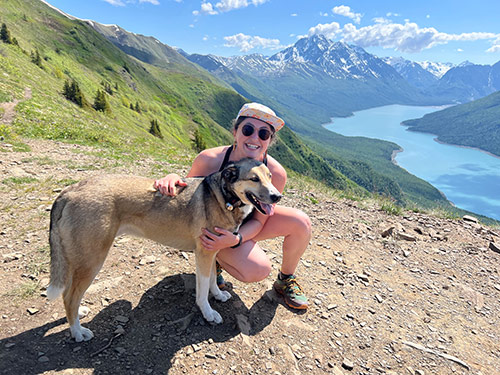
Klein connected with the judge she worked for, and loved that the Alaska Court of Appeals handles exclusively criminal and post-conviction relief cases. Three of the four judges are women and former public defenders, a great match for her personally and professionally.
With the state’s physical beauty providing endless opportunities for outdoor exploration, Klein has traveled to remote corners of the state, tried unfamiliar activities, and developed new hobbies. She spent a year in Kodiak — a town of about 6,000 people located on an island in the Gulf of Alaska — and learned to grow her own garden and forage for wild berries and mushrooms.
Klein notes that Alaska’s youth as a state means the law there is still evolving, which often makes legal practice feel more groundbreaking amid creating new rules and procedures.
“It can feel more creative and entrepreneurial as people try to move and shape the law where they want it to go, as well as grow and develop resources and services here that simply don’t exist yet,” Klein says. “The legal community is small, which I enjoy because the interpersonal relationships and opportunities for connection are strong, and there are possibilities for advancement and involvement that I think are likely less available in more populated areas.
“It’s a very high caliber of practice. The folks who settle here have the credentials to work anywhere, but choose Alaska because they genuinely like living here and this fosters actual work-life balance. I came to Alaska for a one-year adventure, but I stayed because I found a lifestyle and sense of community that I loved.”